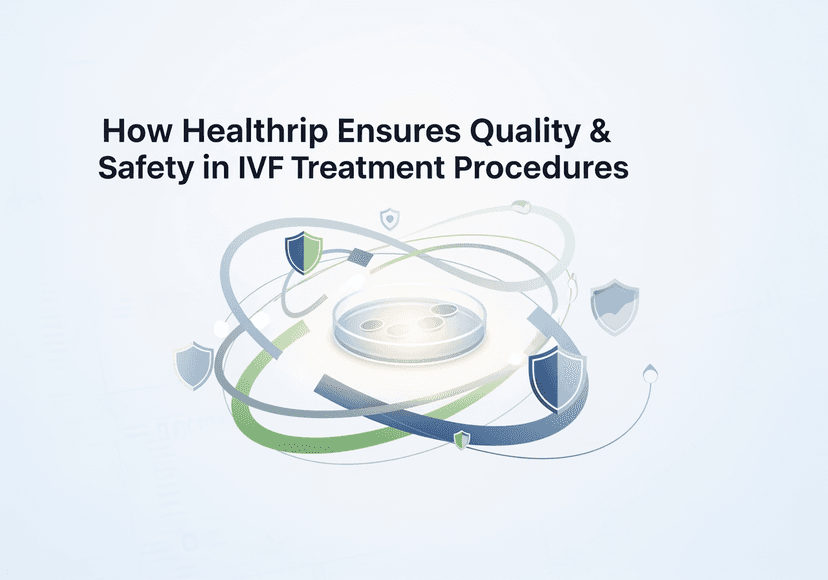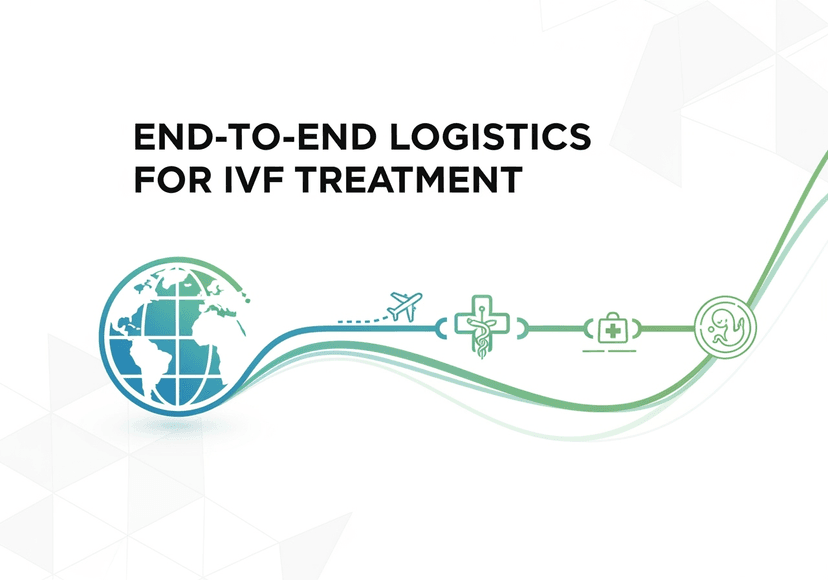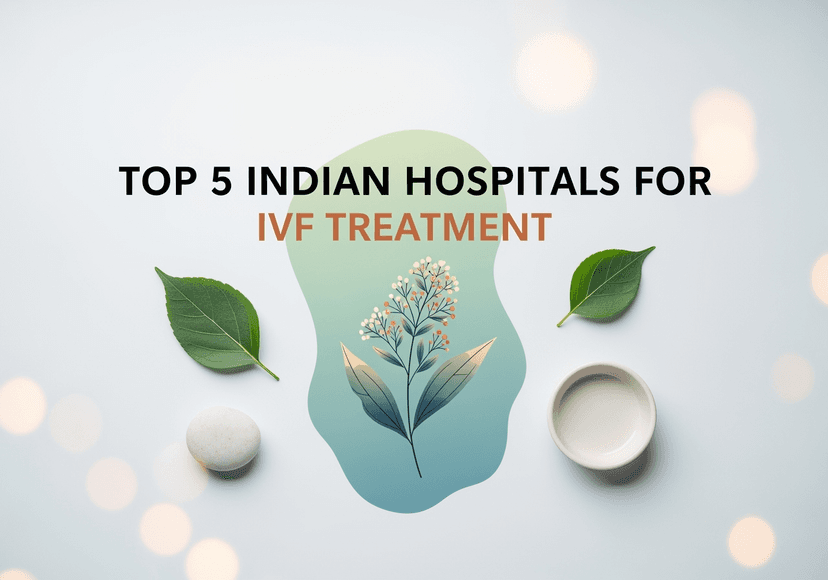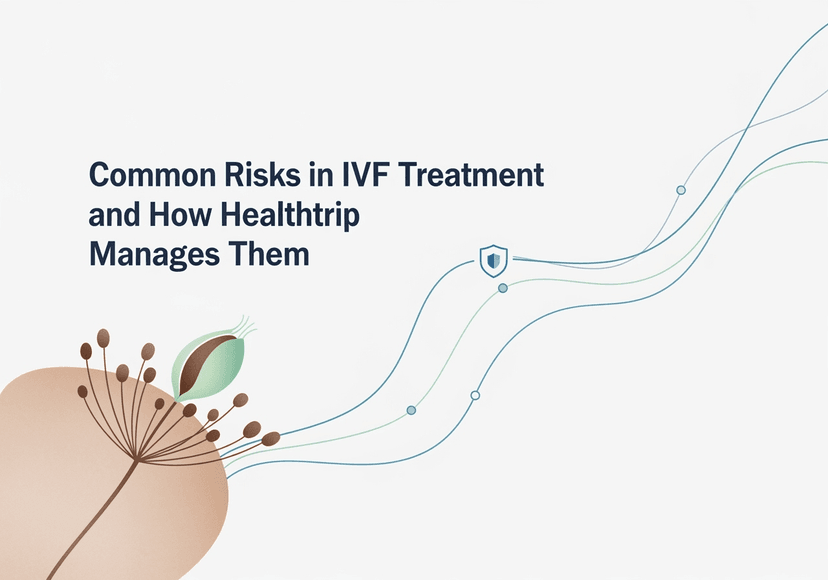
Who Should Consider IVF Treatment? Healthtrip Expert Insights
13 Oct, 2025
 Healthtrip
Healthtrip- Understanding IVF: A Basic Overview
- Female Infertility: When IVF Becomes a Viable Option - Consider hospitals like Memorial Bahçelievler Hospital, Memorial Sisli Hospital
- Male Infertility: How IVF Can Help - Consider hospitals like NMC Specialty Hospital, Al Nahda, Dubai, Thumbay Hospital
- Age-Related Fertility Decline: The Role of IVF - Consider hospitals like Yanhee International Hospital, Vejthani Hospital
- Genetic Disorders: IVF with Preimplantation Genetic Testing (PGT) - Consider hospitals like Fortis Escorts Heart Institute, Fortis Shalimar Bagh
- Unexplained Infertility: Exploring IVF as a Solution - Consider hospitals like Max Healthcare Saket, Fortis Memorial Research Institute, Gurgaon, Fortis Hospital, Noida
- What to Expect During the IVF Process: A Step-by-Step Guide
- Conclusion: Is IVF Right for You?
Understanding IVF: A Quick Overview
IVF, or In Vitro Fertilization, is a type of assisted reproductive technology (ART) that involves retrieving eggs from a woman's ovaries and fertilizing them with sperm in a laboratory. The resulting embryo(s) are then transferred to the woman's uterus, with the hope of a successful pregnancy. It's a complex process, but the basic steps include ovarian stimulation, egg retrieval, fertilization, embryo culture, and embryo transfer. For many, IVF represents a last resort after other fertility treatments have failed, but for others, it might be the most logical first step, especially when specific fertility issues are present. Think of it as a meticulously orchestrated dance between science and the body’s natural processes. As exciting as it may sound, understanding the ins and outs of IVF is pivotal before making any decisions. Healthtrip can connect you with leading fertility clinics, such as Yanhee International Hospital, where you can get personalized consultations and understand every aspect of the procedure.
Most popular procedures in India
Who Should Consider IVF? Key Indicators
Several factors might point towards IVF as a viable option. One common indicator is blocked or damaged fallopian tubes. These tubes are crucial for natural conception, as they're the pathway for the egg to travel from the ovary to the uterus and for sperm to reach the egg. If they're blocked, fertilization can't occur naturally. Similarly, men with severe male factor infertility, such as low sperm count or poor sperm motility, may also find IVF with intracytoplasmic sperm injection (ICSI) to be a beneficial solution. ICSI involves injecting a single sperm directly into an egg, bypassing many of the hurdles sperm face in natural fertilization. Women with ovulation disorders, such as polycystic ovary syndrome (PCOS), which makes regular ovulation difficult, might also consider IVF. Furthermore, unexplained infertility – where the cause of infertility remains unknown even after thorough testing – is another reason to explore IVF. Don't you think that peace of mind is worth exploring? When faced with these complex issues, Healthtrip can help you access consultations with specialists at renowned hospitals, like Fortis Memorial Research Institute, Gurgaon, bringing you closer to a solution.
Wellness Treatments
Give yourself the time to relax
Lowest Prices Guaranteed!

Lowest Prices Guaranteed!
Specific Medical Conditions
Certain medical conditions can significantly impact fertility and often make IVF a necessary or highly recommended option. Endometriosis, a condition where tissue similar to the lining of the uterus grows outside the uterus, can distort the anatomy of the reproductive organs and affect egg quality. Women with severe endometriosis may find IVF to be the most effective path to pregnancy. Another condition is premature ovarian failure (POF), also known as early menopause, where the ovaries stop functioning before the age of 40. In such cases, IVF with donor eggs can be a viable option. Furthermore, genetic disorders that parents don't want to pass on to their children can be addressed through IVF with preimplantation genetic testing (PGT). PGT involves testing embryos for specific genetic conditions before implantation, ensuring only healthy embryos are transferred. Remember, diagnosing and managing these conditions are essential first steps. Through Healthtrip, you can access a network of experienced doctors at hospitals like Vejthani Hospital, who can provide accurate diagnoses and guide you through the best course of action.
Age-Related Fertility Decline
Age is a significant factor influencing fertility, particularly for women. As women age, the quality and quantity of their eggs decline, making natural conception more challenging. After the age of 35, the chances of getting pregnant naturally decrease, and the risk of miscarriage increases. Women in their late 30s and early 40s who have been trying to conceive without success may find IVF to be a helpful option. IVF can help bypass some of the age-related challenges by carefully selecting the healthiest eggs for fertilization. It's not just about women, however. While the impact of age on male fertility is less pronounced, sperm quality can also decline with age, making IVF with ICSI a potential solution for older couples. Time is of the essence when considering fertility treatments. With Healthtrip, you can quickly connect with reputable clinics like Taoufik Clinic, Tunisia, where you can discuss your options and create a personalized treatment plan to address your unique needs and timeline.
IVF for Single Parents and Same-Sex Couples
IVF isn't solely for heterosexual couples struggling with infertility; it's also a pathway to parenthood for single individuals and same-sex couples. Single women can use donor sperm in conjunction with IVF to conceive. This allows them to experience pregnancy and childbirth and build their families. Similarly, same-sex male couples can use IVF with a donor egg and a gestational carrier (surrogate) to have a child. Both partners can be actively involved in the process, cherishing the moments leading up to the arrival of their little one. For same-sex female couples, reciprocal IVF is an option where one partner provides the egg, which is then fertilized and implanted in the other partner, allowing both to share a unique and intimate role in the journey. Building a family is a deeply personal and emotional experience, regardless of your relationship status or sexual orientation. Healthtrip understands this and can assist you in finding inclusive and supportive fertility clinics like NMC Specialty Hospital, Al Nahda, Dubai, that cater to the diverse needs of all individuals and couples pursuing parenthood.
Weighing the Pros and Cons of IVF
Before embarking on the IVF journey, it's crucial to consider both the advantages and disadvantages. On the plus side, IVF offers a higher success rate compared to other fertility treatments, especially for certain conditions. It provides the opportunity for genetic testing of embryos, reducing the risk of passing on hereditary diseases. IVF can also offer hope when other methods have failed, potentially fulfilling dreams of parenthood. However, IVF is an expensive procedure, and the costs can quickly add up, especially if multiple cycles are needed. It's also an emotionally and physically demanding process, involving hormone injections, frequent monitoring, and the potential for side effects. Multiple pregnancies, such as twins or triplets, are more common with IVF, which can increase the risk of complications for both the mother and babies. The decision to pursue IVF should be made after careful consideration, weighing the potential benefits against the risks and costs. Seeking guidance from fertility specialists and support groups can provide valuable insights and help you make an informed decision. Healthtrip can connect you with experienced professionals at hospitals like Saudi German Hospital Cairo, Egypt, who can provide you with personalized advice and support throughout your decision-making process.
Healthtrip's Role in Your IVF Journey
Navigating the world of IVF can be daunting, but you don't have to do it alone. Healthtrip is here to support you every step of the way, from providing information and resources to connecting you with the best fertility clinics and specialists worldwide. We understand that each individual's journey is unique, and we're committed to providing personalized assistance to meet your specific needs. Whether you're looking for a clinic with state-of-the-art technology, a doctor with extensive experience in IVF, or affordable treatment options, Healthtrip can help you find the right fit. We also offer support services to help you manage the emotional and logistical challenges of IVF, ensuring you feel informed, empowered, and cared for throughout the process. We can assist you with travel arrangements, accommodation, and communication with your chosen clinic, making your IVF journey as smooth and stress-free as possible. Remember, taking the first step towards parenthood is a courageous decision, and Healthtrip is here to help you turn your dreams into reality. Consider exploring facilities such as LIV Hospital, Istanbul through Healthtrip's network to discover the best options for your journey.
Understanding IVF: A Basic Overview
In vitro fertilization (IVF) – it sounds like something straight out of a sci-fi movie, doesn't it? But in reality, it's a widely used and often successful assisted reproductive technology (ART) that has brought joy to countless families around the world. Simply put, IVF is a process where eggs are retrieved from a woman's ovaries and fertilized by sperm in a laboratory. The resulting embryo(s) are then transferred back into the woman's uterus, hopefully leading to a successful pregnancy. Think of it as a little extra help getting the sperm and egg together, bypassing some of the natural hurdles that can sometimes make conception a challenge. It's not a one-size-fits-all solution, but for many couples facing infertility, IVF offers a ray of hope, a chance to experience the incredible journey of parenthood. The process itself involves several stages, from initial consultations and ovarian stimulation to egg retrieval, fertilization, embryo culture, and finally, the embryo transfer. Each step is carefully monitored and tailored to the individual's needs, making it a highly personalized experience. Though it can seem complex, understanding the basic principles of IVF can empower you to make informed decisions and navigate the process with confidence, potentially embarking on a life-changing adventure with Healthtrip supporting your journey.
The reasons people turn to IVF are varied and often deeply personal. It could be due to issues with a woman's fallopian tubes, making it difficult for the egg and sperm to meet. Maybe there are problems with ovulation, or perhaps the man's sperm count is low, or the sperm aren't as motile as they need to be. In some cases, it's a combination of factors, or even unexplained infertility, where doctors can't pinpoint a specific cause. Whatever the reason, IVF offers a way to overcome these obstacles and increase the chances of conception. It's important to remember that infertility is a medical condition, and seeking help is a sign of strength, not weakness. IVF is just one of the many tools available to help couples achieve their dream of having a family, and with the right support and medical expertise, it can be a truly transformative experience. Many individuals and couples find themselves exploring options like IVF, and understanding the basics is the first step towards making informed, empowered decisions about their reproductive health.
Female Infertility: When IVF Becomes a Viable Option - Consider hospitals like Memorial Bahçelievler Hospital, Memorial Sisli Hospital
Female infertility can stem from a variety of factors, turning the path to parenthood into a complex and emotionally taxing journey. Imagine the frustration and heartache of wanting a child, only to be met with repeated disappointment month after month. This is the reality for many women. Blocked or damaged fallopian tubes, a common culprit, prevent the egg from traveling to the uterus and the sperm from reaching the egg. Ovulation disorders, such as polycystic ovary syndrome (PCOS), can disrupt the regular release of eggs, making conception unpredictable. Endometriosis, where uterine tissue grows outside the uterus, can also interfere with fertility. Uterine fibroids or polyps, abnormalities in the uterus, and even premature ovarian failure, where the ovaries stop functioning before age 40, can all contribute to female infertility. These are just a few of the many potential challenges women may face when trying to conceive.
When more conservative treatments, such as medication or surgery, haven't yielded the desired results, IVF can emerge as a viable and often life-changing option. IVF bypasses many of these obstacles, offering a direct route to fertilization. For women with blocked fallopian tubes, IVF provides a way to conceive without relying on the tubes to transport the egg and sperm. In cases of ovulation disorders, IVF allows doctors to carefully control the ovulation process and retrieve mature eggs for fertilization. Even for women with endometriosis or uterine abnormalities, IVF can increase the chances of a successful pregnancy. It's like a carefully orchestrated dance, where medical science steps in to guide the egg and sperm towards their ultimate goal. Hospitals like Memorial Bahçelievler Hospital and Memorial Sisli Hospital are known for their expertise in reproductive technologies and could be great resources for those considering this path. IVF isn't a magic bullet, but it offers hope and a chance to fulfill dreams of parenthood, which is why it is a solution that so many explore with Healthtrip.
Male Infertility: How IVF Can Help - Consider hospitals like NMC Specialty Hospital, Al Nahda, Dubai, Thumbay Hospital
Often overlooked, male infertility contributes significantly to the challenges couples face when trying to conceive. It's not just a "female" issue; in fact, male factors are responsible for about half of all infertility cases. Low sperm count (oligospermia), poor sperm motility (asthenospermia), and abnormal sperm morphology (teratospermia) are common culprits. These issues can make it difficult for sperm to reach and fertilize the egg, even under ideal conditions. Sometimes, blockages in the male reproductive tract can prevent sperm from being released. Hormonal imbalances or genetic factors can also play a role. And let's not forget lifestyle factors like smoking, excessive alcohol consumption, and exposure to environmental toxins, which can all negatively impact sperm quality. It's a complex landscape, and pinpointing the exact cause of male infertility can sometimes be a challenging puzzle.
Fortunately, IVF, often in conjunction with intracytoplasmic sperm injection (ICSI), offers powerful solutions for overcoming male infertility. ICSI involves injecting a single sperm directly into an egg, bypassing the need for the sperm to swim and penetrate the egg on its own. This technique is particularly beneficial for men with low sperm count, poor sperm motility, or abnormal sperm morphology. Even if only a few viable sperm are available, ICSI can significantly increase the chances of fertilization. IVF with ICSI represents a remarkable advancement in reproductive technology, providing hope for couples who might otherwise struggle to conceive. Hospitals like NMC Specialty Hospital, Al Nahda, Dubai, and Thumbay Hospital are recognized for their expertise in male infertility treatments and advanced IVF techniques. It's all about finding the right tools and the right expertise to unlock the potential for parenthood, transforming what once seemed impossible into a beautiful reality.
Also Read:
Age-Related Fertility Decline: The Role of IVF - Consider hospitals like Yanhee International Hospital, Vejthani Hospital
As we journey through life, our bodies undergo numerous changes, and fertility is no exception. For women, age-related fertility decline is a well-documented phenomenon. The quality and quantity of a woman's eggs gradually decrease, particularly after the age of 35, and this decline accelerates after 40. This can make natural conception more challenging. The good news is that In Vitro Fertilization (IVF) offers a beacon of hope for many individuals and couples facing this reality. IVF can help overcome age-related fertility issues by retrieving eggs, fertilizing them in a lab, and then transferring the resulting embryos into the woman's uterus. This process bypasses many of the natural hurdles that age can create. For women considering IVF due to age-related fertility challenges, it's essential to seek guidance from experienced fertility specialists who can assess their situation comprehensively and create a personalized treatment plan. Hospitals like Yanhee International Hospital and Vejthani Hospital in Thailand have a proven track record in assisted reproductive technologies and can provide cutting-edge treatments with personalized care. They offer comprehensive fertility assessments and customized IVF protocols to maximize the chances of success, even for women in their late 30s and 40s.
Understanding the Impact of Age on Egg Quality
One of the primary challenges associated with age-related fertility decline is the deterioration of egg quality. As a woman ages, her eggs are more likely to have chromosomal abnormalities, increasing the risk of miscarriage or genetic disorders in the offspring. IVF, combined with Preimplantation Genetic Testing (PGT), can address this issue. PGT involves screening embryos for chromosomal abnormalities before they are transferred to the uterus. This helps select healthy embryos with the highest chance of leading to a successful pregnancy. The process gives hopeful parents greater peace of mind and significantly increases the likelihood of a successful pregnancy. Fertility clinics around the world, including facilities like Yanhee International Hospital and Vejthani Hospital, have invested heavily in advanced PGT technologies. These hospitals utilize state-of-the-art genetic testing methods to provide comprehensive embryo screening. Moreover, egg freezing, or oocyte cryopreservation, is another strategy that can help women preserve their fertility at a younger age. Women can freeze their eggs when they are younger and of higher quality and use them in IVF treatments later in life. This proactive approach allows women to extend their reproductive window and increase their chances of having healthy children.
Genetic Disorders: IVF with Preimplantation Genetic Testing (PGT) - Consider hospitals like Fortis Escorts Heart Institute, Fortis Shalimar Bagh
For couples who know they are carriers of genetic disorders, the prospect of passing on these conditions to their children can be deeply concerning. Fortunately, IVF combined with Preimplantation Genetic Testing (PGT) offers a powerful solution. PGT is a sophisticated technique that allows embryos created through IVF to be screened for specific genetic disorders before they are implanted in the uterus. This provides hopeful parents with the opportunity to select embryos that are free from the genetic condition they carry, significantly reducing the risk of having a child with the disorder. The process involves taking a small sample of cells from each embryo and analyzing them for the presence of the targeted genetic mutation. Only embryos that are found to be free of the genetic disorder are then transferred back into the woman's uterus, increasing the chances of a healthy pregnancy and delivering a healthy baby. Hospitals like Fortis Escorts Heart Institute and Fortis Shalimar Bagh in India are renowned for their expertise in IVF and PGT. They offer comprehensive genetic screening services and personalized fertility plans to help couples navigate the complexities of genetic disorders and achieve their dream of having a healthy family. Their teams of experienced geneticists and embryologists work collaboratively to ensure the accuracy and reliability of PGT results, providing couples with the confidence they need to move forward with their IVF journey.
The Ethical and Emotional Considerations of PGT
While PGT offers a remarkable opportunity to prevent genetic disorders, it also raises ethical and emotional considerations that couples should carefully consider. The decision to undergo PGT and select embryos based on their genetic status can be emotionally challenging and requires careful thought and discussion. Couples often grapple with questions about the moral implications of selecting certain embryos over others and the potential impact on the status of embryos that are not selected for transfer. It's crucial for couples considering PGT to have access to comprehensive genetic counseling and emotional support to help them navigate these complex issues. Ethicists recommend offering counseling services to address the psychological and ethical aspects of PGT. These counseling sessions help couples clarify their values, understand the implications of their decisions, and make informed choices that align with their beliefs. Furthermore, it's essential to ensure that PGT is performed with the utmost respect for the dignity of all embryos and that the process is conducted in a transparent and ethical manner. Hospitals like Fortis Escorts Heart Institute and Fortis Shalimar Bagh recognize the importance of addressing these ethical and emotional considerations. They integrate genetic counseling as part of their comprehensive fertility services, providing couples with the support they need to make informed decisions that are right for them.
Also Read:
Unexplained Infertility: Exploring IVF as a Solution - Consider hospitals like Max Healthcare Saket, Fortis Memorial Research Institute, Gurgaon, Fortis Hospital, Noida
Dealing with infertility is undeniably challenging, but it becomes even more frustrating when the cause remains a mystery. Unexplained infertility, where standard fertility tests fail to identify a clear reason for the inability to conceive, affects a significant number of couples. In such cases, IVF can be a viable and effective solution. Although the exact cause of infertility is unknown, IVF bypasses many of the natural steps required for conception, increasing the chances of success. During IVF, eggs are retrieved and fertilized in a laboratory setting, and the resulting embryos are then transferred directly into the uterus. This process overcomes potential issues with ovulation, fertilization, and implantation, which may be contributing to unexplained infertility. IVF provides a controlled environment that optimizes the chances of fertilization and embryo development, offering hope to couples who have been struggling to conceive without a clear diagnosis. Hospitals like Max Healthcare Saket, Fortis Memorial Research Institute in Gurgaon, and Fortis Hospital in Noida are known for their comprehensive approach to addressing unexplained infertility. These hospitals conduct thorough evaluations to rule out any underlying conditions that may have been missed by initial tests. They develop personalized IVF protocols tailored to each couple's unique circumstances, maximizing their chances of success.
The Benefits of IVF When Other Treatments Fail
When faced with unexplained infertility, many couples try various treatments like ovulation induction or intrauterine insemination (IUI) before considering IVF. While these treatments can be effective for some, they may not be sufficient for couples with unexplained infertility. IVF offers several advantages over these less intensive treatments. One key benefit is that IVF allows for closer monitoring of the fertilization process and early embryo development. In the lab, embryologists can carefully assess the quality of the eggs and sperm, ensuring that fertilization occurs successfully. They can also monitor the growth and development of the embryos, selecting the healthiest ones for transfer. This level of control and monitoring isn't possible with less invasive treatments like IUI. Furthermore, IVF provides an opportunity for additional procedures like Intracytoplasmic Sperm Injection (ICSI), where a single sperm is directly injected into an egg to facilitate fertilization. This can be particularly helpful if there are subtle sperm abnormalities that are not detected by standard semen analysis. IVF also allows for Preimplantation Genetic Testing (PGT), which can screen embryos for chromosomal abnormalities and genetic disorders, further increasing the chances of a healthy pregnancy. For couples who have experienced unsuccessful IUI cycles or other fertility treatments, IVF can be a highly effective option to overcome unexplained infertility and ultimately achieve their dream of parenthood. Healthtrip can connect you with experienced fertility specialists at hospitals like Max Healthcare Saket, Fortis Memorial Research Institute, and Fortis Hospital, who can guide you through the IVF process and maximize your chances of success.
Also Read:
What to Expect During the IVF Process: A Step-by-Step Guide
Embarking on the IVF journey can feel overwhelming, but understanding the different steps involved can ease anxiety and empower you to actively participate in your treatment. The IVF process typically involves several key stages, starting with initial consultation and evaluation, followed by ovarian stimulation, egg retrieval, fertilization, embryo culture, and finally, embryo transfer. Each step plays a crucial role in the overall success of the treatment. The initial consultation involves a comprehensive assessment of your medical history, physical examination, and fertility testing to determine your suitability for IVF. Based on the evaluation, your fertility specialist will develop a tailored treatment plan to address your specific needs. Ovarian stimulation involves using fertility medications to stimulate the ovaries to produce multiple eggs. Regular monitoring with ultrasounds and blood tests is essential to track the development of the follicles, which contain the eggs. Once the follicles have reached the appropriate size, a trigger shot is administered to induce final egg maturation. Egg retrieval is a minimally invasive procedure performed under sedation. The fertility specialist uses a transvaginal ultrasound to guide a needle into the ovaries and aspirate the eggs from the follicles. The retrieved eggs are then fertilized with sperm in the laboratory using either conventional insemination or ICSI. The fertilized eggs, now called embryos, are cultured in the lab for several days, during which their development is closely monitored. The healthiest embryos are selected for transfer back into the woman's uterus. Embryo transfer is a simple, painless procedure that involves inserting a catheter through the cervix and placing the selected embryos into the uterus. After the embryo transfer, you'll be advised to rest and continue taking any prescribed medications to support implantation. A pregnancy test is performed about two weeks later to determine if the IVF cycle was successful.
Navigating the Emotional and Physical Aspects of IVF
The IVF process can be emotionally and physically demanding, and it's important to be prepared for the challenges that may arise. One of the biggest challenges is the emotional rollercoaster that many couples experience throughout the treatment. The hope and anticipation leading up to each procedure, followed by the anxiety during the waiting period, can take a toll on your mental and emotional well-being. It's crucial to have a strong support system in place, whether it's your partner, family, friends, or a support group. Sharing your feelings and experiences with others who understand what you're going through can provide comfort and validation. The fertility medications used during ovarian stimulation can cause side effects such as bloating, mood swings, and fatigue. These side effects are usually mild and temporary but can still be uncomfortable. It's helpful to stay hydrated, eat a healthy diet, and get regular exercise to minimize these side effects. Be sure to communicate any concerns or discomfort to your fertility specialist, who can adjust your medication dosage or recommend strategies to manage the side effects. In addition to the physical side effects, the financial burden of IVF can also be a significant stressor. The cost of IVF treatment can vary depending on the clinic and the number of cycles required. It's important to research the costs involved and explore options for financial assistance, such as insurance coverage, grants, or financing programs. Remember, you're not alone in this journey, and seeking support from healthcare professionals, counselors, and other couples who have been through IVF can make a world of difference. Healthtrip is here to provide you with resources and connect you with experienced fertility specialists who can guide you through every step of the IVF process.
Conclusion: Is IVF Right for You?
Deciding whether or not to pursue IVF is a deeply personal decision that requires careful consideration of your individual circumstances, medical history, and values. IVF can be a life-changing option for many couples struggling with infertility, but it's not a one-size-fits-all solution. Before making a decision, it's essential to have a thorough discussion with your fertility specialist to understand the potential benefits and risks of IVF in your specific situation. Consider factors such as your age, the cause of your infertility, your overall health, and your financial resources. IVF can be particularly beneficial for couples who have tried other fertility treatments without success, those with specific fertility issues like blocked fallopian tubes or severe male factor infertility, and women with age-related fertility decline. However, it's also important to be realistic about the success rates of IVF, which can vary depending on various factors such as age, egg quality, and the clinic's expertise. It's crucial to set realistic expectations and be prepared for the possibility that IVF may not be successful on the first attempt. If you're feeling overwhelmed or unsure about whether IVF is right for you, consider seeking a second opinion from another fertility specialist. Getting multiple perspectives can help you make a more informed decision. Ultimately, the decision of whether or not to pursue IVF is yours to make. Weigh the pros and cons, consider your values and priorities, and trust your instincts. Remember, Healthtrip is here to provide you with the information and resources you need to make the best decision for your unique situation. Consult with our network of trusted fertility specialists to explore your options and embark on your journey towards parenthood with confidence.
Related Blogs

How Healthtrip Ensures Quality & Safety in IVF Treatment Procedures
Detailed guide on ivf treatment, featuring doctors, hospitals, risks, recovery,

End-to-End Logistics for IVF Treatment with Healthtrip's Support
Detailed guide on ivf treatment, featuring doctors, hospitals, risks, recovery,

Healthtrip's Care Coordinators: Your Support During IVF Treatment
Detailed guide on ivf treatment, featuring doctors, hospitals, risks, recovery,

Top 5 Indian Hospitals for IVF Treatment
Detailed guide on ivf treatment, featuring doctors, hospitals, risks, recovery,

Post-IVF Treatment Diet and Lifestyle Tips
Detailed guide on ivf treatment, featuring doctors, hospitals, risks, recovery,

Common Risks in IVF Treatment and How Healthtrip Manages Them
Detailed guide on ivf treatment, featuring doctors, hospitals, risks, recovery,










